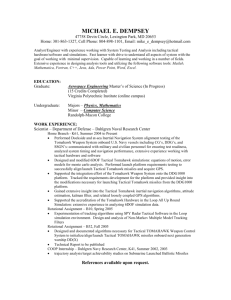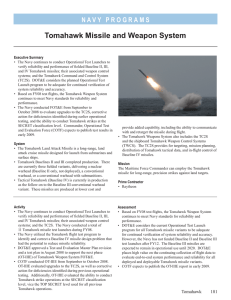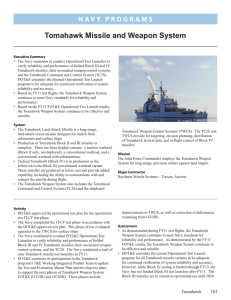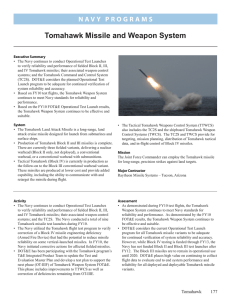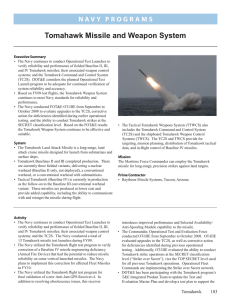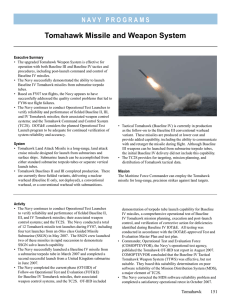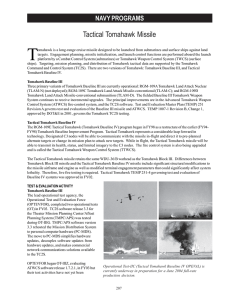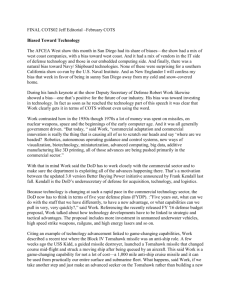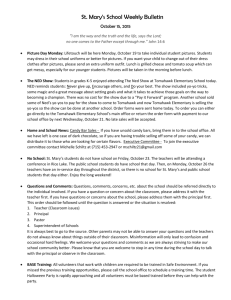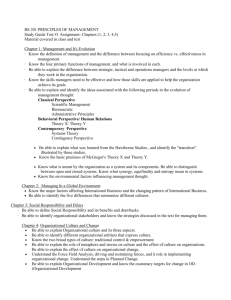Tactical Tomahawk Weapon System (TTWS) Evaluation Report
advertisement
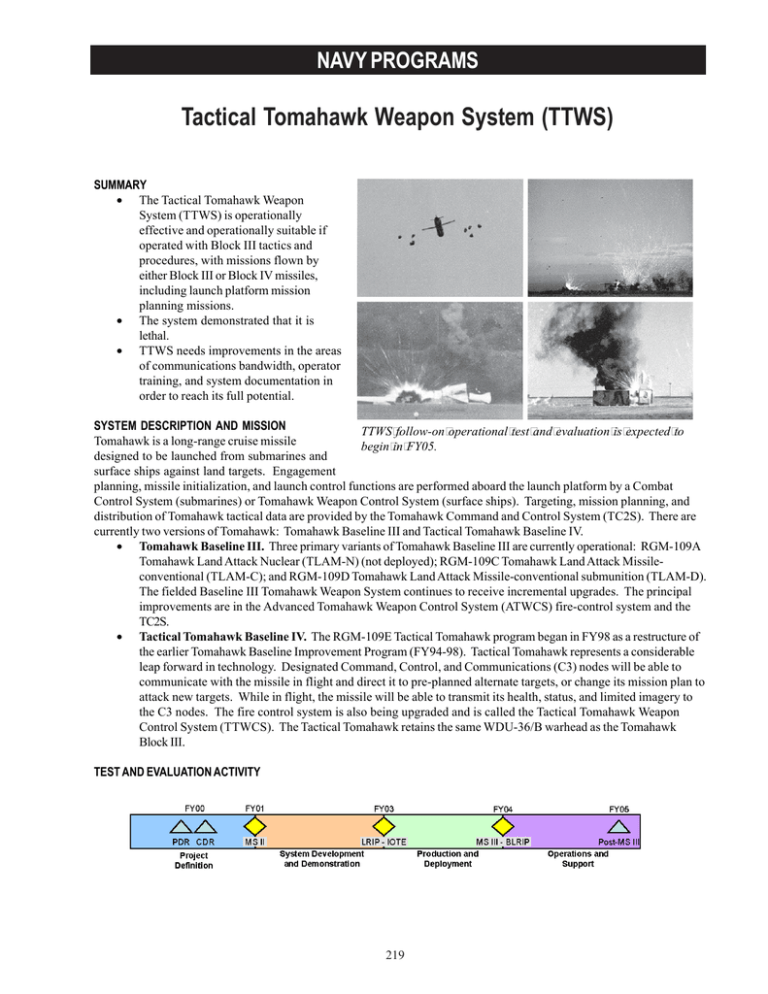
NAVY PROGRAMS Tactical Tomahawk Weapon System (TTWS) SUMMARY • The Tactical Tomahawk Weapon System (TTWS) is operationally effective and operationally suitable if operated with Block III tactics and procedures, with missions flown by either Block III or Block IV missiles, including launch platform mission planning missions. • The system demonstrated that it is lethal. • TTWS needs improvements in the areas of communications bandwidth, operator training, and system documentation in order to reach its full potential. SYSTEM DESCRIPTION AND MISSION TTWS follow-on operational test and evaluation is expected to Tomahawk is a long-range cruise missile begin in FY05. designed to be launched from submarines and surface ships against land targets. Engagement planning, missile initialization, and launch control functions are performed aboard the launch platform by a Combat Control System (submarines) or Tomahawk Weapon Control System (surface ships). Targeting, mission planning, and distribution of Tomahawk tactical data are provided by the Tomahawk Command and Control System (TC2S). There are currently two versions of Tomahawk: Tomahawk Baseline III and Tactical Tomahawk Baseline IV. • Tomahawk Baseline III. Three primary variants of Tomahawk Baseline III are currently operational: RGM-109A Tomahawk Land Attack Nuclear (TLAM-N) (not deployed); RGM-109C Tomahawk Land Attack Missileconventional (TLAM-C); and RGM-109D Tomahawk Land Attack Missile-conventional submunition (TLAM-D). The fielded Baseline III Tomahawk Weapon System continues to receive incremental upgrades. The principal improvements are in the Advanced Tomahawk Weapon Control System (ATWCS) fire-control system and the TC2S. • Tactical Tomahawk Baseline IV. The RGM-109E Tactical Tomahawk program began in FY98 as a restructure of the earlier Tomahawk Baseline Improvement Program (FY94-98). Tactical Tomahawk represents a considerable leap forward in technology. Designated Command, Control, and Communications (C3) nodes will be able to communicate with the missile in flight and direct it to pre-planned alternate targets, or change its mission plan to attack new targets. While in flight, the missile will be able to transmit its health, status, and limited imagery to the C3 nodes. The fire control system is also being upgraded and is called the Tactical Tomahawk Weapon Control System (TTWCS). The Tactical Tomahawk retains the same WDU-36/B warhead as the Tomahawk Block III. TEST AND EVALUATION ACTIVITY 219 NAVY PROGRAMS • • Tomahawk Baseline III. The lead operational test agency, the Navy’s Operational Test and Evaluation Force, completed two operational test (OT) phases in FY04. The TC2S software release TMPC/APS 3.4 was tested during OT-IIIH. The Navy completed OT-IIIZ, evaluating ATWCS software release 1.7.2.1, in FY04. The improvements ensure compatibility with existing and future Naval and Joint C3I systems. Tomahawk Baseline IV. The Navy completed test event OT-IIB, evaluating the Phase 1A Tactical Tomahawk (TTWCS backward compatibility with Block III missiles and TC2S), in FY04. Test events included two 48-hour at-sea battle group scenarios in which TTWCS received tasking and intelligence inputs; performed mission planning, engagement planning, and C3 functions; and launched simulated missiles, including salvo launches. Other test events included two Block III All-Up-Round test flights, a maintenance demonstration, and supplementary battle force simulation exercises at the Naval Surface Warfare Center. Test event OT-IIC, a system-level operational evaluation for Tactical Tomahawk Baseline IV, took place in FY04. Testing began with two week-long at-sea battle group scenarios in which TTWCS received tasking and intelligence inputs; performed mission planning, engagement planning, and C3 functions; launched simulated missiles, including salvo launches; and conducted post-launch communications with simulated missiles. Actual Block IV All-Up-Round launches were conducted from both surface and submarine platforms, with post-launch two-way communications being demonstrated. Laboratory testing using high-fidelity missile flight simulations supplemented flight testing and scenario testing. The Navy tested mission planning functions extensively, with surface and submarine launch platforms each creating 30 missions, and shore facilities creating 30 more. TEST AND EVALUATION ASSESSMENT • Tomahawk Baseline III. The testing conducted during phase OT-IIIH resulted in findings that TC2S software version TMPC/APS 3.4 is operationally effective and operationally suitable. All Critical Operational Issues were resolved as “satisfactory” and fleet introduction of TC2S software was recommended. The OT-IIIZ resulted in findings that ATWCS software release 1.7.2.1 is operationally effective and operationally suitable. • Tomahawk Baseline IV. The testing conducted during phase OT-IIB resulted in findings that Phase 1A Tactical Tomahawk (TTWCS backward compatibility with Block III missiles and TC2S) is operationally effective and operationally suitable. With one exception, all Critical Operational Issues were resolved as “satisfactory.” Fleet introduction of Phase 1A Tactical Tomahawk was recommended, together with rapid resolution of remaining deficiencies and verification of their corrections. The testing conducted during phase OT-IIC resulted in findings that the Baseline IV TTWS is operationally effective and operationally suitable if limited to execution of existing Block III tactics and procedures using the Block III or Block IV missile. The TTWS was found not operationally effective and not operationally suitable to execute the full array of Block IV post-launch activity. TTWS needs improvements in the areas of communications bandwidth, operator training, and system documentation in order to reach its full potential. The Navy recommended fleet introduction of the TTWS, with the proviso that tactics and procedures be limited as discussed above, and that the necessary improvements be developed, implemented, and verified through follow-on testing as quickly as possible. DOT&E submitted the beyond low-rate initial production report for Tactical Tomahawk on July 13, 2004. DOT&E found that TTWS testing was adequate to determine operational effectiveness, operational suitability, and lethality; that the TTWS is operationally effective, operationally suitable, and lethal; and that the TTWS should not be employed with post-launch C3 and tasking until the deficiencies identified in the testing have been corrected and verified through follow-on operational test and evaluation. TTWS follow-on operational test and evaluation is expected to begin in FY05. 220
